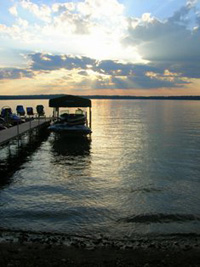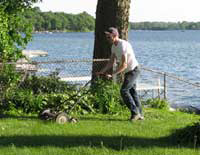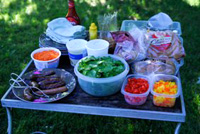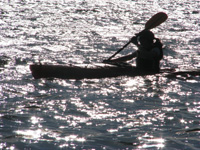Summer Tips
Do A Little, Save A Lot
Welcome summer! As citizens go for a swim in one of Wisconsin's lakes, cookout in the backyard or go on a long summer bike ride, air quality remains an important part of everyday life.
The hot humid weather is the perfect time to find ways to save energy.
Things Kids Can Do
Hey kids! There are lots of things kids can do to help reduce air pollution this summer. Visit the EEK! website [exit DNR] for ideas.
On Vacation
On Vacation
Wisconsin offers excellent places to visit during summer vacations. One of the best ways to reduce air pollution is by reducing travel exhaust and traveling locally. Rather than booking a trip to Europe, consider visiting a scenic local state park or attractions that Wisconsin has to offer.
- Wisconsin State Parks
- Wisconsin State Natural Areas
- Explore the local metropolitan area. Even for those that live in or near a city, chances are there are new places to see or old places to see again. Visit the local zoo, art museum, children's museum, botanical gardens, neighborhood parks or city nature trails.
- Stay locally. Visit a nice bed and breakfast in a nearby town for a fun adventure.
- Picking an environmentally efficient way of getting to far off places also helps. Planes are the highest transportation polluters and emit thousands of tons of carbon dioxide. Trains and buses emit fewer air pollutants.
- Reduce waste when traveling. Packing a lunch with reusable lunch bags rather than stopping at a restaurant or eating fast food reduces disposable packaging.
"Green" Lawns
Practice "Green" Lawn Care
Keep in mind the following energy and emission-saving tips for lawn care.
- Replace gas-powered equipment such as mowers and leaf blowers with electric, rechargeable or manual equipment.
- Gas-powered equipment should be filled and used in the evening hours when possible. Also spill-proof, low-emitting gas cans help reduce vapor pollution.
- Keep mower blades sharp and undersides of mowers clean. The lawn will look better and the mower will run more efficiently.
- Use lawn clippings as mulch for the garden. This helps save on clipping disposal and buying mulch.
- Do not burn leaves or trash. Compost or recycle instead.
- Water the lawn sparingly and in the evening or early morning. Mid-day watering evaporates faster, preventing grass roots from soaking up the water necessary for growth. To stay green, established lawns need about 1 inch of water per week in total, split over two or three applications. Purchasing or making a water gauge to measure the amount of water (including rain) that falls on the lawn each week can help avoid water waste.
Buy a spill-proof, low-emitting gas can. Set up barrels to collect rainwater for the lawn or garden. Using rain barrels will reduce the amount of water, energy, and money (for water pumping and/or treatment) that is spent on the lawn, it will also decrease the amount of stormwater runoff polluting the streams and lakes.
- Mow less. Ask a local nursery for slow-growing, drought resistant grass and seed mixtures.
- Try native landscaping [PDF exit DNR] to minimize lawn mowing, watering and fertilizing.
- Native Plant Nurseries in Wisconsin
Cookouts
Cookouts and Potlucks
Consider eco-friendly ways to enjoy hosting a party.
- Use reusable cookware, utensils and plates. Substitute cloth napkins in place of paper ones. This helps keep garbage out of the landfill.
- Find local and organic food to cook.
- For charcoal grilling, find charcoal that is harvested from sustainable forests and is free of additives like coal dust.
- Lighter fluid is not friendly to air quality and the environment. When combined with charcoal, it can release carbon monoxide, particulate matter and soot, and volatile organic compounds . Use an electric or chimney charcoal starter to light charcoal to limit air pollutants.
- Many die-hard grill enthusiasts believe charcoal is the only way to grill; however, gas and electric grills are less harmful to the environment and air quality than charcoal grills.
- Provide vegetarian options for guests.
On The Boat
On The Boat
Try some of these energy-saving and eco-friendly boating tips this summer.
- Consider eco-friendly ways to enjoy being out on the water. Kayaking, canoeing, sailing or sailboarding are just a few options.
- Do not overfill the gas tank. Fuel expands as it warms in the tank and excess fuel will escape through the vent line. Big waves may also cause overfilled gas tanks to leak into the water and air. When filling an inboard fuel tank, use a hand to check for air escaping from the vent. When the tank is nearly full, there will be a distinct increase in airflow. That is the signal to stop filling. Automatic shutoff gas nozzles do not always work; the fuel filling nozzle should always be attended.
- Recycle fluids. Ask the local marina about recycling engine oil and antifreeze. Oil filters and batteries are also recyclable!
- Buying a new motor? Consider a four-stroke engine instead of a two-stroke engine. With older engines, an estimated 30% of fuel ends up in the water. Newer improved engines greatly reduce the amount of fuel that goes into the water and air emissions. Four-stroke engines are quieter, smoother and easier to start and use.
Travel Wisely
Travel Wisely
Summer is a great time to get outdoors after a long winter. Consider biking when commuting to work or running errands. Below are some other suggestions on ways to improve air quality.
- Ride a bike or walk instead of driving. Vehicles on the road create more than 25% of all air pollution nationwide and are a large source of global climate change emissions.
- Combine errands into one trip. Several short trips taken from a cold start can use twice as much fuel as a longer multi-purpose trip covering the same distance when the engine is warm. This also avoids retracing the route and reduces the distance traveled, not only saving fuel but also wear and tear on the car.
- When driving, anticipate stops and slow down gradually. It takes 20% less gas to accelerate from 5 mph than from a full stop.
- Get rid of excess items in the trunk. The weight of the extra cargo makes engines work harder, burns more gas and releases more emissions. Gas mileage reduces 4% for every 100 pounds of excess weight carried in a car.
- To learn more about choosing a greener vehicle and minimizing environmental impacts visit
Video
Learn some eco-driving tips in the video below.
Save Energy At Home
Save Energy At Home
- Looking to make some energy-efficient improvements to your home? Visit the Focus on Energy Home Energy Rebate page for information on currently available rebate programs and upcoming federally funded rebate opportunities.
- Conserve energy by turning off lights when leaving a room and turning off computers and televisions when not in use.
- Purchase energy efficient lighting or use natural lighting whenever possible.
- Find appliances that include the Energy Star [exit DNR] label.
- Install windows that are energy efficient.
- Buy green power, energy made by using renewable energy such as wind, solar, geothermal or hydropower.
- Use natural ventilation to cool the house as the weather warms up. Open windows at night for naturally cooler air and close them during the day to keep the cool air inside.
- Control the moisture entering the house by providing sufficient landscaping drainage and gutters. A dehumidifier may help the house feel cooler.
- Use window shades to keep sunlight from warming the house too much during the day.
- Provide landscaping to create a microclimate around the house. Trees and shrubs can increase shade or provide a windbreak.
For more information about conserving energy at home and reducing carbon footprints, visit Focus on Energy [exit DNR]
Video
This video shows some ways to save energy around the house.








